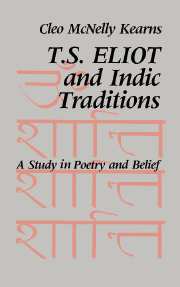3 - Buddhist Traditions
Published online by Cambridge University Press: 07 October 2011
Summary
There is a mysticism [in Bouvard et Pécuchet] not to be extracted from Balzac, or even from Mrs. Underhill: “Ainsi tout leur a craqué dans la main.”
T. S. EliotWHEN HE WROTE The Waste Land, Eliot later remarked, he had been on the verge of “becoming” a Buddhist.1 The appeal of this religious and philosophical system so different from his own is difficult to uncover at a distance, though it seems to have had to do with its combination of intellectual rigor and exoticism. (Eliot's attitude toward Buddhism as a set of beliefs is further discussed in Chapter 5.) Eliot's imaginative involvement with Buddhist texts, however, began, as we have seen, with his boyhood reading of Sir Edwin Arnold's Light of Asia. “I must have had a latent sympathy for the subject-matter,” he recalled, “for I read it through with gusto, and more than once.” As late as 1944 he affirmed that he “preserved a warm affection for the poem” and that, when he met anyone else who liked it, he felt drawn to that person (OPP 38–9).
The Light of Asia is no masterpiece, either as minor poetry, where Eliot ranked it, or as a reflection of Buddhist philosophy, but it is – or was for its age – something perhaps more useful, a work informed throughout by a love for its subject matter and a relatively solid knowledge of the Indic sources available to the author.
- Type
- Chapter
- Information
- T. S. Eliot and Indic TraditionsA Study in Poetry and Belief, pp. 67 - 84Publisher: Cambridge University PressPrint publication year: 1987



